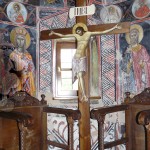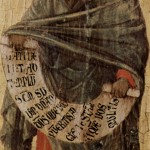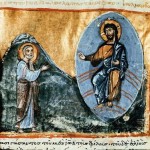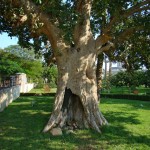What It’s About: The Lenten lectionary is about covenants, but this is THE covenant. This is one of the three tellings of the Sinai covenant (see also: Exodus 34, Deuteronomy 5)–the one where Moses goes up the mountain and comes back with the Decalogue.
What It’s Really About: This is really about the salvation history of the Israelites. Here there is both a recollection of God’s past saving acts (“…out of the land of Egypt, out of the house of slavery…”) and a look forward to the way God will relate to God’s people in the future. This is the giving of the law (or, at least, some major parts of the law), but Christians often unduly place the emphasis on the law in this story. This is about God making a covenant with God’s people, with hopes and expectations and history on both sides. This is about the God who wants to be involved, who wants to be a part of life. The laws are expressions of that desire on the part of God and on the part of God’s people to be in deep relationship with each other. Covenant is the overriding concern here: how are we bound up together?
What It’s Not About: This is not about legalism. This is the major mistake Christians make about Jewish scripture, and it’s the biggest slander we enact against our sister faith. Christians tend to read these laws as evidence that Judaism is some sort of zenith of legalism. But God’s people in every time and place come to new understandings of what God’s relationship with God’s people looks like, and for those Israelites gathered at Sinai, it looked like a covenant with stipulations. Most Christians these days pick and choose from among these (the ones in this scripture are usually still followed, but the ones that come later on are often ignored or applied selectively). But this Christian idea that all law is restrictive, burdensome, and death-bringing is simply missing the point of this story. The laws are (the Law is) the way God and the people know and love each other.
Maybe You Should Think About: Maybe you should think about why this version of the Decalogue is the lectionary text, and not the others. What is easier or harder about this text? What is gained or lost?
What It’s About: This is about all of creation and its overflowing response to God.
What It’s Really About: This psalm is a favorite of all of us who once worked as counselors at summer camps (shout-out to my Cove Camp* peeps!). And it’s also an affirmation for all those who find God in the world, and not only in texts and in churches. This psalm gives voice to the sentiment that so many of us feel, and that so many people have felt throughout time: that the divine is revealed in the world around us. It reminds me a little of that great song by Peter Mayer called Holy Now, which talks about nature calling out God’s glory. “Everything is holy now” is not so far from “The heavens are telling the glory of God.” And reading verse 14 aloud in worship might be a nice reminder to folks about why you always say that funny thing before you start the sermon (if you’re one of those preachers that says it).
What It’s Not About: This psalm is not a paean to pantheism. Judaism and Christianity, in their sacred texts, have guarded closely and carefully the line between finding God in creation and seeing creation as divine. This might be why, for example, the heavenly lights are explicitly created in Genesis 1: so that no one gets the wrong idea and calls the sun and the moon gods themselves. This psalm is one of a number of places in the bible where God can be found in the natural world (Job 38 and 39 are my favorite example). You might disagree, and certainly there are sectors of Christianity that do see the natural world as participating in divinity somehow. But this is quite foreign to the cosmology that undergirds this psalm and the rest of the Hebrew Bible.
Maybe You Should Think About: Maybe you should think about getting someone to play that Peter Mayer song in worship. Seriously, it’s great.
What It’s About: This is Paul at his brash and confident best. And here, he’s saying that it’s just fine when we’re not the most powerful or the most wealthy. God wants it that way.
What It’s Really About: Scholars have argued about the composition of Paul’s church in Corinth, because scholars have argued about, literally, all the things. For Corinth, people debate whether the city was a den of sin and iniquity (as its reputation in antiquity had it), or just another good town with a bad reputation. And the church itself sometimes gets seen as a reflection of that. Was it full of sinners? Chapter 5 might suggest so. Was it full of faithful people that Paul loved? He clearly holds this church dear. But Paul here seems to be encouraging them while letting us in on a secret about them: they’re not really very impressive. This is a church made up of “not many” who were wise, powerful, or of noble birth. This is a church made up of nobodies…or at least mostly nobodies. And Paul thinks this is ok…in fact, it’s how God wants it. God chooses the weak, the foolish, the despised. That’ll preach, friends.
What It’s Not About: It’s not about humility, even though Paul was putting himself and all the other church folks down. Paul sees, in this forsakenness that he names, the workings of God! We’re like this because it’s how God set it up! Remember that next time you read a terrifying article about how the new American religious atlas is wiping us all off the map.
Maybe You Should Think About: This might sound strange, but if you’re in a congregation that does litanies, why not make this into one? Why not have people say out loud, to each other, that our many weaknesses and deficiencies are actually an asset? We’re all broken–let’s say it out loud.
What It’s About: Jesus kicking butt and taking names in the temple business district.
What It’s Really About: For John, this story is about setting a tone. In Mark, Matthew, and Luke, this episode comes at the end of Jesus’ life, and it’s the most immediate cause for his death. But in John, this is what Jesus does right after the wedding at Cana–his first sign. He turns some water into wine, gets a little snippy with his mother, and then chases some cows and sheep out of the temple. It makes a big difference that this is at the beginning of the gospel, rather than at the end as in the synoptic gospels. And verses 20 and 21 make it clear that we are to understand this as pointing to Jesus’ own death and resurrection. Verse 22 is for people like us–people who know how the story ends, but are somehow still reading it. “I open at the close,” as a wise theologian once wrote.
What It’s Not About: This is not about corrupt Judaism and pure Christianity. Much like Christians mis-read the Exodus story from this week to say that Jews are obsessed with the law, Christians mis-read John here to say that Jesus is destroying Jewish institutions and systems. Jesus says “take these things out of here,” implying that the “here,” the temple, was worth maintaining and protecting. It’s the pollution he was concerned with, as most Jews would have been concerned. Jesus here is guarding the Jewish temple and the Jewish God, not rejecting them.
Maybe You Should Think About: What would happen if you preached the difference between where this story falls in John and the synoptic gospels? Many ministers I talk to are afraid of doing something like that. They’re afraid that their congregation will rebel at the suggestion that scripture isn’t perfect. But scripture isn’t perfect, at least in that kind of way, and by the way, John put this story here for a reason. What is the theological freight of putting this story in chapter 2? What does it mean differently than what it means as part of the passion week story? Maybe you should think about preaching that difference, and seeing what meaning comes out of it.
* The name of the camp has changed, as has my theology (significantly) since I worked there, but I remain deeply grateful for my time at the Cove.
















